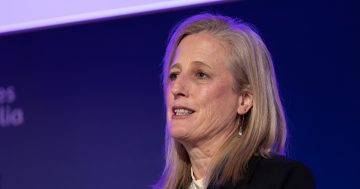Melissa Browne* says if we are ready to demand equal representation of women at conferences and on panels, why are we not willing to expect the same in the boardroom?

Photo: Benjamin Child
I’ve been asked a number of times over the last few months what I think about quotas on boards.
For the longest time it was a notion I’ve felt incredibly uncomfortable with — the idea that others may perceive you only received your position because of gender and not merit.
Then a very interesting campaign began last year that completely changed my mind.
That campaign was to include more female speakers delivering keynotes at conferences and on panels.
The argument became that it was ludicrous to hold the opinion that there were not enough articulate, knowledgeable, expert-subject-matter women that would be able to speak and be part of panels talking about, well almost anything.
And we weren’t arguing that we wanted one or two women given token representation at these conferences and panels — we were demanding that we have equal representation.
Yes, demanding.
That’s because the language around this has been incredibly strong.
Women, and many good men have said it’s ridiculous that women aren’t represented and popular male conference speakers such as Matt Church have started publicly stating they will boycott a panel that doesn’t have female representation.
Imagine if the blokes refused to be on a board that didn’t have equal female representation?
I find it interesting that we have been so incredibly vocal about female speakers and the importance of equal or minimum representation.
Which means we’re being vocal about demanding female quotas at conferences and on panels.
Yet, we feel so uncomfortable demanding the same when it comes to board representation.
I mean, surely, we find it ludicrous that there are not enough articulate, knowledgeable, strategic, expert-subject-matter women who could be part of a board?
Yet, we continue to be overwhelmingly underrepresented.
And I get it.
I get how it feels to be the “token woman” and in fact to be called that by men on your “board”.
In my case, it was a forum of six men and two women.
All part of a group because of their business size and certainly in my case, my business was more profitable than some of the men in that forum.
Yet, when we went as part of a retreat and spoke to a vineyard owner in the Hunter Valley, he felt relaxed enough to eventually say to us all, “Yeah, I had a token skirt in my forum too.”
Yes, really.
That’s why I think we need to simply get over ourselves and understand that some blokes are going to think we’re there because of tokenism.
No matter what we do.
It’s absolutely not OK but it shouldn’t stop us taking a seat at the table.
Because the truth of the matter is that many of the blokes on boards today are there because of mateship, unconscious bias or the private school they went to.
Yet, are we calling them out on it?
In my example above, that organisation is now insisting that two women be placed into forums together because it’s better for the whole group.
The assumption is already that the women are incredible, talented, extraordinary businesswomen.
But the organisation has recognised that the women will be heard better when they’re sent in at a minimum of two.
Maybe it’s time we set the same standard for board representation.
Across the board.
Because let’s be honest.
A woman is almost never there because of tokenism.
She’ll generally only accept a position when she’s 90 per cent sure she can do it so you can be bloody sure she is capable.
Yet, with men, the generalisation is that they’ll put their hand up at 50 per cent.
Perhaps that’s what we should be calling out instead.
What is accepted is that our female board representation is overwhelmingly poor.
(June 2018 statistics had the percentage of females on ASX listed companies at 21.5 per cent.)
We expect mandatory representation at conferences and panels — maybe it’s time to expect the same in the boardroom and perhaps even for men to refuse a seat at a board in favour of a women where representation isn’t happening.
Now, there’s a concept of “male champions” I could actually get behind.
That’s why, ladies, I believe we need to get over ourselves when it comes to quotas and boards and start demanding representation.
To recognise that unconscious bias and mateship exist and are often the driving reasons behind current male board positions.
If we want to break that cycle, then we need to force the boys to look outside their own pond and into our diverse, interesting, expert pond.
So yes, you could say I’m absof*ckinglutely pro female quotas on boards.
* Melissa Browne is CEO of accounting firm A&TA and financial planning firm The Money Barre.
This article first appeared at womensagenda.com.au.











